Which Matters More: Education or Experience?

Education and experience may go hand in hand but are often considered separate entities on the job front. With the job market being so fiercely competitive post-pandemic, we wanted to know how hiring managers and employees alike were beginning to value both their education and their experience. Had one started to truly take precedence over the other?
After speaking to a mix of more than 1,000 hiring managers and employees, we have finally been able to put the age-old question of education versus experience to bed. They shared their opinions on how the two stacked up overall and within certain industries. Hiring managers even told us how much more they would pay for certain degrees and amounts of experience in comparison. To see how your own education and experience stack up, keep reading.
Overall Opinions
To kick off our study, we wanted to glean initial reactions to the pivotal question, “Which is more important: education or experience?” Employee and employer responses are recorded below, as well as their opinions on education from top-tier colleges and universities.
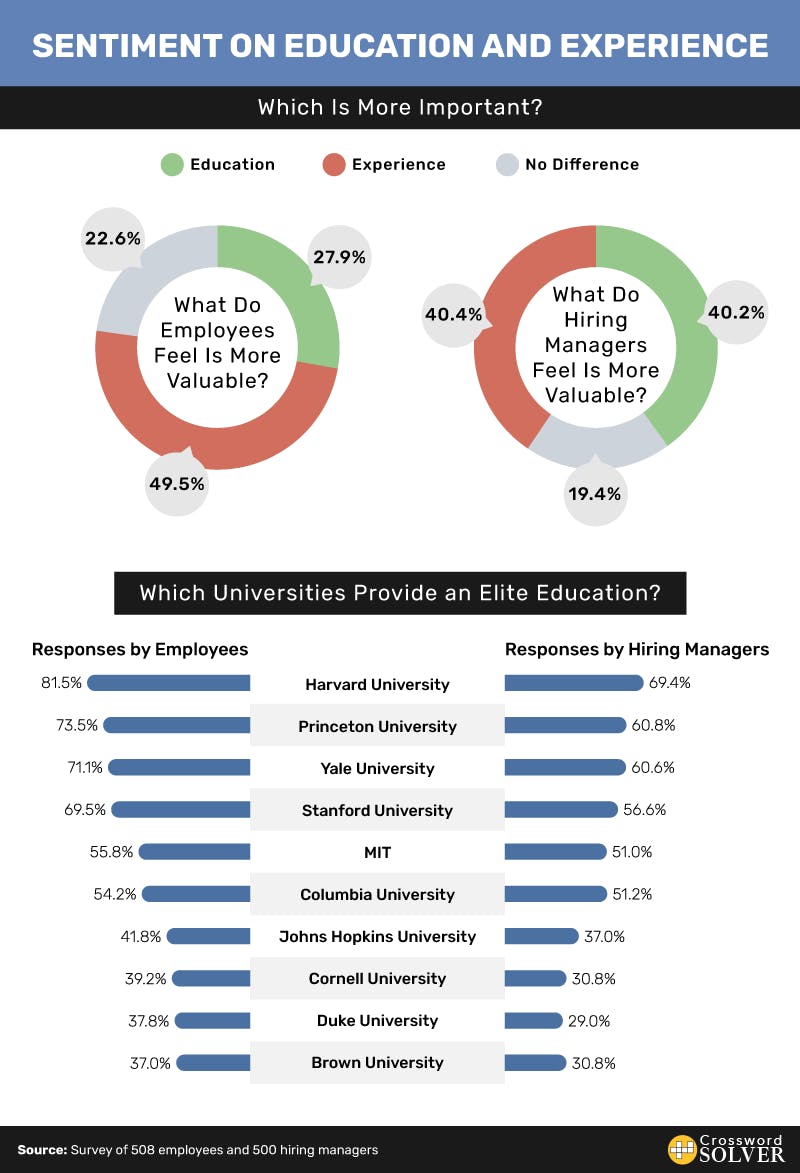
Employees were much more likely to value experience over education. Half of this response group argued that experience mattered more than their education, or perhaps the education of others. Employers, on the other hand, appeared more willing to give applicants with just education a shot. This contrast perhaps reflects two different perceptions of value: While hiring managers may recall hiring fresh-out-of-college applicants who adapted successfully, employees may be feeling that they ultimately learned how to do the job through experience.
When it came to specific schools, however, employees (as opposed to hiring managers) were actually more likely to consider the education “elite.” For example, 80.9% of employees felt Harvard offered an elite education, while only 69.4% of hiring managers said the same. This suggests that there is more to the story of what employers value in education beyond the name and prestige of a school. Perhaps the additional value they see in an applicant’s education goes deeper.
Equivalent to a Degree
Digging deeper into how a degree is valued, we asked employers and employees alike to consider a hypothetical: How many years of job experience is equivalent to a degree? Each type of graduate degree was considered.
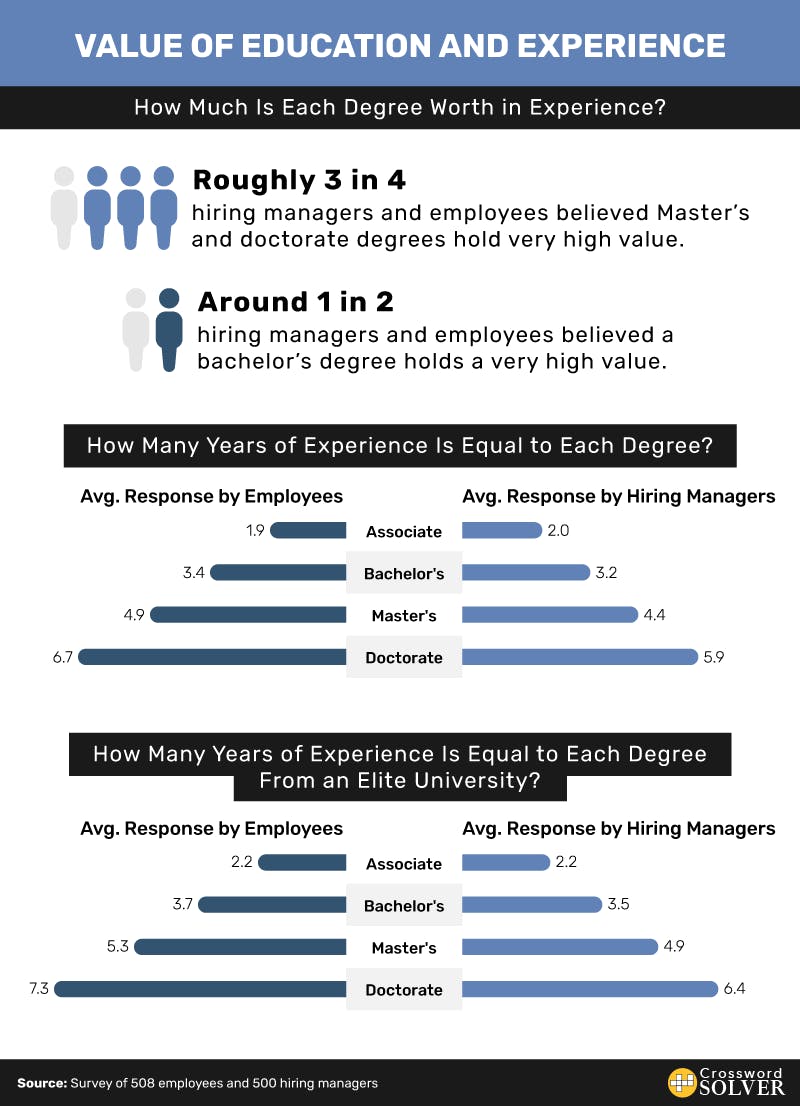
Only half of all hiring managers felt that a bachelor’s degree had “a very high value.” Before interpreting this as a lack of value placed on education, know that 75% felt master’s and doctorate degrees had “a very high value.” Perhaps this reflects the fact that the percentage of people possessing four-year degrees has been jumping significantly in the past few years, causing bachelor degrees to feel more commonplace.
When asked how many years of experience a person would need to equate to a doctorate, hiring managers said 5.9, while employees said 6.7. When asked to consider a similar question with regards to a degree from an elite university, employees said 7.3 years, while hiring managers said 6.4.
Industry-Specific Experience
As we moved beyond the general perceptions of education versus experience, opinions started to change. For specific industries, employees felt experience was all that mattered, while others felt a job in other industries should legally require a bachelor’s degree to even pursue.
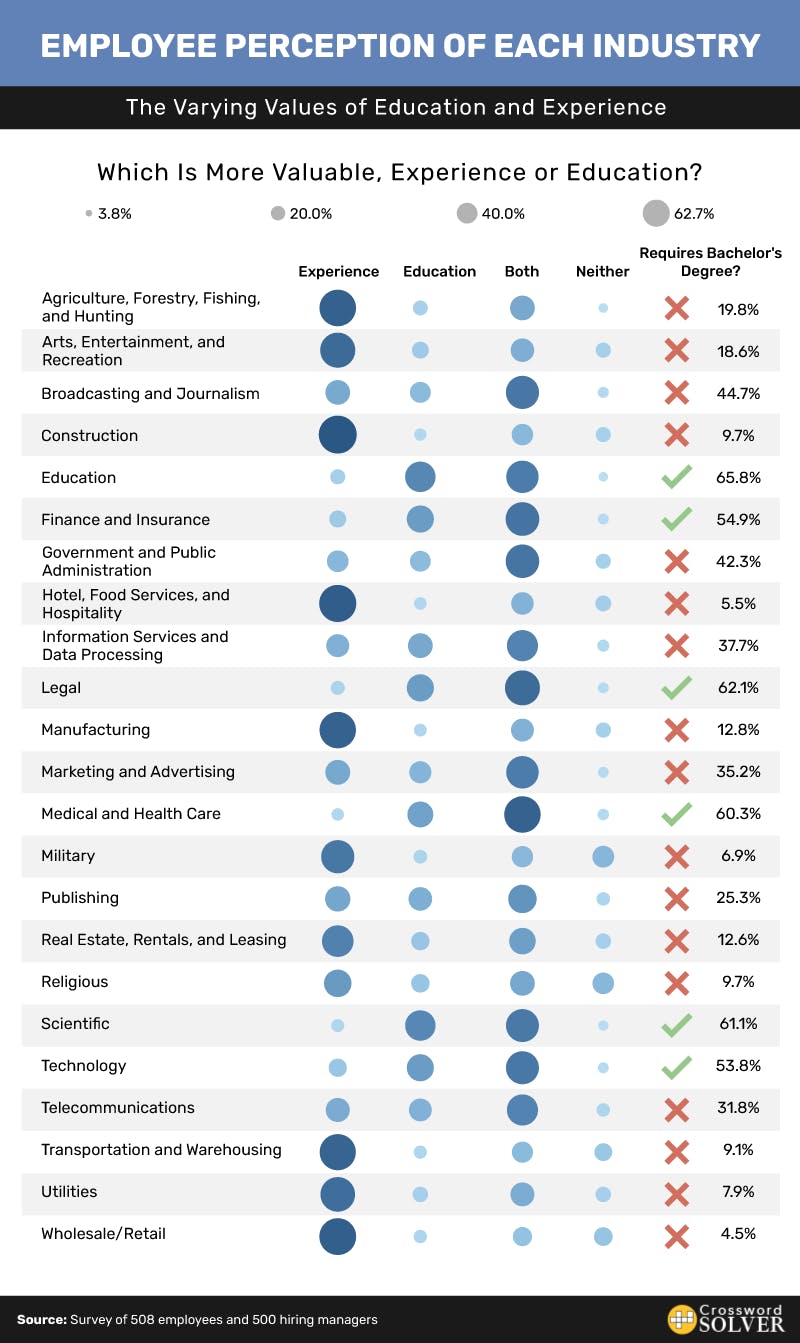
When people were asked to consider specific industries, the luster of education appeared to wear off. Especially for hands-on work like agriculture, construction, or the arts, employees heavily weighed experience over education. But even for more desk-oriented jobs, like finance and information services, most respondents chose both education and experience as equivalently valuable, as opposed to just valuing education alone.
Even the jobs that require a bachelor’s degree, like those in the legal and technology fields, still primarily valued experience or a combination of education and experience. In fact, there wasn’t a single industry respondent who valued education more than experience, which is surprising considering the high percentage of respondents that chose education as generally more valuable than experience earlier in the study.
Post-Pandemic Perceptions
Employment was one of the first obvious upheavals from the pandemic. With this in mind, we asked respondents to consider how their perceptions of education and experience may have changed since March of 2020.
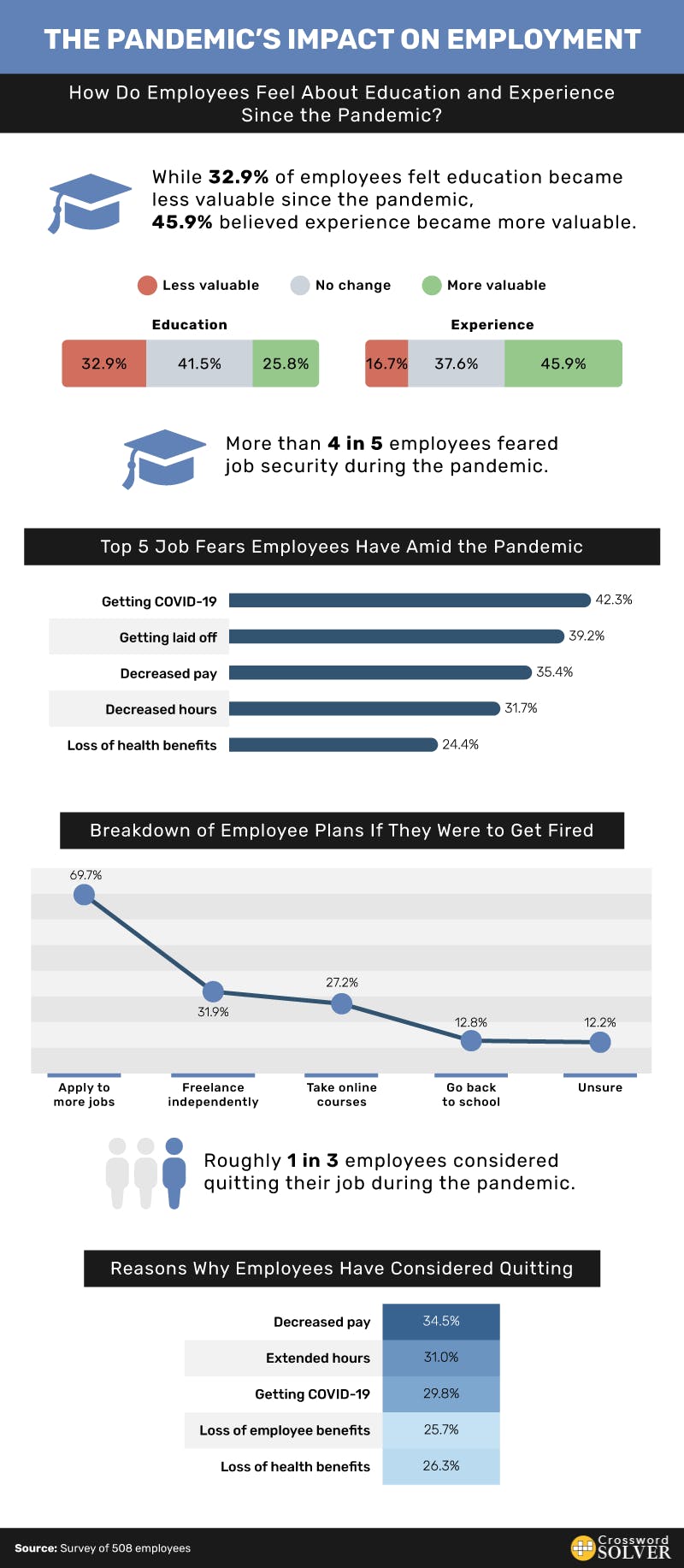
The pandemic’s overall impact on employment is difficult to calculate. Unemployment rates reached levels not seen since data collection began in 1948. For workers without a college degree, these numbers were even worse. According to our respondents, however, education is typically perceived to be less valuable today than it was pre-pandemic. Instead, they started to perceive experience much more highly.
In spite of mass unemployment numbers, the number one fear employees had was actually contracting COVID-19. Bear in mind, however, that this pool of respondents have all managed to stay employed during the pandemic and may have higher levels of job security than the average person in the U.S. If this group were to get fired, the plan for most (69.7%) was to start applying to new jobs, indicating a lack of a financial safety net. Another 31.9% would freelance independently.
Even for those with jobs, things haven’t been necessarily coming up roses. Roughly 1 in 3 employed persons have considered quitting, even in such economically turbulent times. Why? The most common reason was decreased pay (34.5%) and extended hours (31%).
Post-Pandemic Hiring
We next wanted to know how the pandemic had impacted hiring managers specifically. Were they more or less likely to value education or experience now? What are they looking for most in a post-pandemic applicant? And where are they sourcing candidates?

Since the pandemic’s onset, both education and experience have become more valuable to hiring managers. That said, experience was getting comparatively more attention. Hiring managers also have the luxury of becoming more selective today. With so many qualified candidates out of work and actively looking for jobs, today’s highly competitive market has allowed hiring managers to choose from the cream of the crop. Sixty-five percent agreed that this larger talent pool has driven their increased selectivity post-pandemic.
Experience was also the first thing that 82% of hiring managers looked for in this newly competitive pool. By comparison, only 55.2% said the same thing about education. While both are important, experience is evidently the most valuable asset a post-pandemic applicant can possess.
Salary Scenarios
The concept of value is difficult to pinpoint; for the last part of our study, we wanted respondents to think strictly in financial terms. Considering a hypothetical base salary of $100, we wanted hiring managers to think how much more they would be willing to pay for different degrees and amounts of comparative experience.
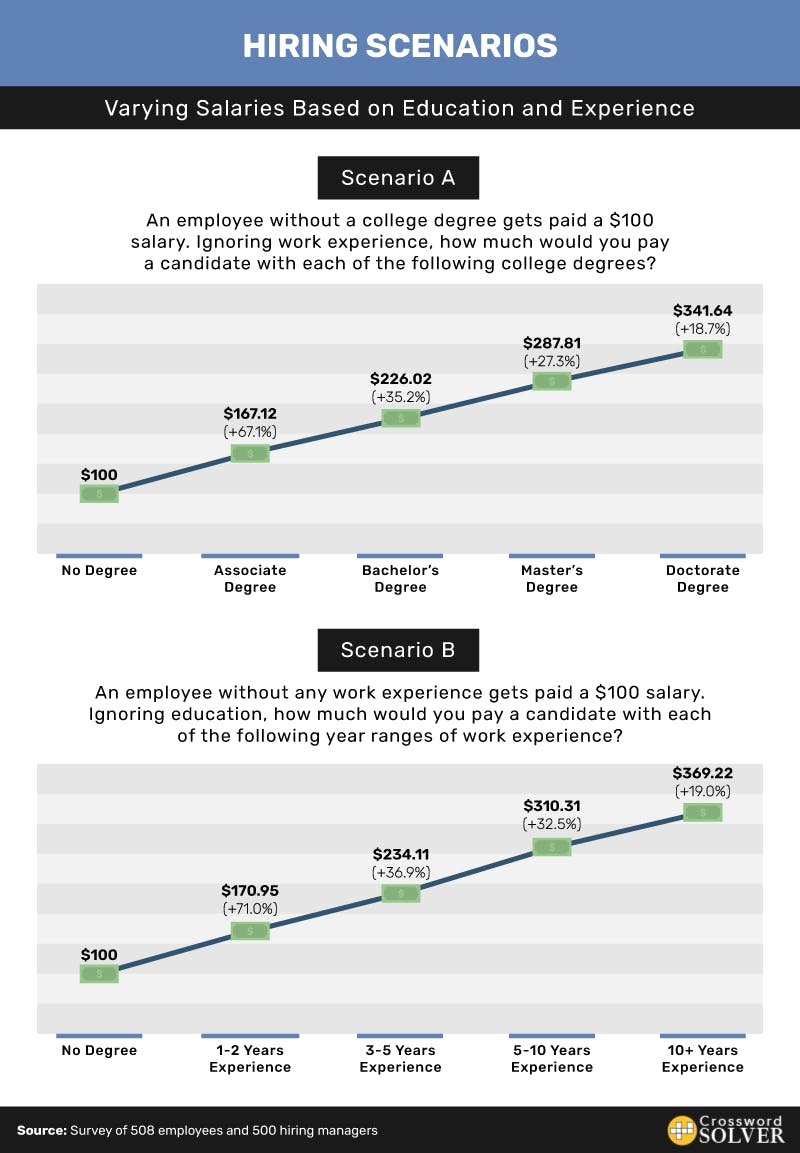
Respondents were told to consider a person with absolutely no education and no experience as having a $100 salary. For scenario A, they were then asked to completely ignore work experience, and consider how much of a raise they would give for each type of degree. On average, a hiring manager was willing to give a person with only an associate degree an additional $67.12, which represented a 67.12% increase from having no education at all. With a bachelor’s degree, hiring managers were willing to give an additional $126. This means that having a bachelor’s degree can effectively double the amount a manager would be willing to give you in terms of salary. As of 2019, college graduates in the U.S. earn $30,000 more every year than their degree-free counterparts. If post-pandemic hiring managers are any indication, this difference gap may continue to widen.
Experience saw an even greater rise in salary than education. With just one to two years of experience, average salaries increased by 71%. On the extreme end of the spectrum, a person with over 10 years of experience saw their salary increase from $100 to $369.22. By comparison, a person with the highest possible education, or a doctorate degree, only saw their salary rise to $341.64. Evidently, when money is on the table, experience is ultimately valued – or at least paid – more highly.
Education as an Experience
Ironically, education and experience aren’t as separate of entities as we may think. Classrooms are often experiences of collaboration, communication, meeting deadlines, and even having a “boss” of sorts. Experience often involves an enormous learning curve as well, many times involving training, learning new software, or actually performing the task at hand.
Crossword puzzles represent the perfect example of education and experience colliding. They educate you on new words, new phrases, pieces of history, and so much more. And through experience, you can watch yourself get better and better. That said, there will always be a word or two that stumps you. In those instances, head to Crossword-Solver.io, where we can help you find that missing word. Then you can get back to gaining more education and experience! After all, the two are incredibly valuable.
Methodology and Limitations
We collected responses from 508 employees and 500 hiring managers. Of the 508 employees surveyed, 51% were female, 48.6% were male, and 0.4% identified as nonbinary. Additionally, the average age of employees was 36.2 with a standard deviation of 10.4 years. Of the 500 hiring managers surveyed, 46% were female, 53.6% were male, and 0.4% identified as nonbinary. The average age of hiring managers was 38.8 with a standard deviation of 11.3 years.
The main limitation of this study is the reliance on self-report, which is faced with several issues such as, but not limited to, attribution, exaggeration, recency bias, and telescoping. Data are solely representative of self-reported claims by employees and hiring managers. This survey ran during January 2021.
Fair Use Statement
Feeling that you gained both education and experience from reading this information? Share the wealth! Especially in times like these, when jobs can be difficult to come by, it’s important to distribute verified information. When you share, just be sure your purposes are noncommercial and that you link back to this page.
Recent Clues
- TV style guru Crossword Clue
- Unable to see screen Crossword Clue
- Give job back (9) Crossword Clue
- Cut corners Crossword Clue
- Praise shown by Rex to Lord Crossword Clue
- Jean-Baptiste -, French baroque composer of Le Bourgeois gentilhomme, with text by Molière (5) Crossword Clue
- Activist Brockovich Crossword Clue
- Really good; £1,000 Crossword Clue
- Bishop is primarily made to take appropriate sacrament Crossword Clue
- Some salami served for tightwad Crossword Clue
- Drudge Crossword Clue
- Skater Midori Crossword Clue
- General name on a Chinese menu Crossword Clue
- Ringlet (4) Crossword Clue
- Falafel bread Crossword Clue
- 21-Across nest Crossword Clue
- Greek form of trance (6) Crossword Clue
- ___ Lovelace of early computing Crossword Clue
- Nickname for Louis Armstrong Crossword Clue
- Dollar bills Crossword Clue
- Saint in the Caribbean Crossword Clue
- Discrimination is borne by great revolutionary Crossword Clue
- *Confirm to be true Crossword Clue
- "___, humbug!" Crossword Clue
- Atlantic or Pacific Crossword Clue
- Called party's leader past it Crossword Clue
- Gas pipes Crossword Clue
- Make a blunder Crossword Clue
- Of Troy Crossword Clue
- Replied sharply Crossword Clue
- Squeeze; iron Crossword Clue
- Limb with an elbow Crossword Clue
- Withdraw from post Crossword Clue
- Melody Crossword Clue
- Rubber Crossword Clue
- Reviewer is getting note to censure (9) Crossword Clue
- Latest happenings (4) Crossword Clue
- Taken by mouth Crossword Clue
- Actor Cox of "Succession" Crossword Clue
- Gem Crossword Clue
- Make happy Crossword Clue
- What hosts large competition for one part of football team? Crossword Clue
- Poor child sputtering terribly and close to collapse Crossword Clue
- Member on foot in ghetto escapes Crossword Clue
- Cluster in an archipelago Crossword Clue
- The good ___ days Crossword Clue
- Paddle Crossword Clue
- Sees romantically Crossword Clue
- Biz bigwig Crossword Clue
- Stockings Crossword Clue
Trending Clues
- Ardent Crossword Clue
- Temporary art media Crossword Clue
- Big name in transparent Band-Aids for toddlers? Crossword Clue
- Seal or walrus Crossword Clue
- Finger drum Crossword Clue
- Public walkway Crossword Clue
- Girls in Tech founder Gascoigne Crossword Clue
- Baker's powder Crossword Clue
- Horse halter Crossword Clue
- Squat (Hyph.) Crossword Clue
- Congressional record? Crossword Clue
- Sch. Crossword Clue
- Lampoon Crossword Clue
- Comedian Wyatt Crossword Clue
- Henry Purcell opera Crossword Clue
- From time to time Crossword Clue
- Hard, dry biscuit Crossword Clue
- Photoshop maker Crossword Clue
- Remy's brother in "Ratatouille" Crossword Clue
- Done for laughs Crossword Clue
- "Ratatouille" rat Crossword Clue
- Language in southern India Crossword Clue
- Travels on foot Crossword Clue
- Henry Purcell semi-opera Crossword Clue
- Magical letters Crossword Clue
- Dragnets Crossword Clue
- Poker tactic Crossword Clue
- Explicit subject for her? Crossword Clue
- Scheme; fascinate Crossword Clue
- Exasperated question Crossword Clue
- Rock with bands Crossword Clue
- Notify with a delivered message (2 wds.) Crossword Clue
- Route created by foot traffic, generating a shortcut Crossword Clue
- Prefix that means 1-Across Crossword Clue
- Carry-out Crossword Clue
- Item on the base of Maslow's hierarchy Crossword Clue
- Muslim head covering Crossword Clue
- Ancient theaters Crossword Clue
- In the midst of Crossword Clue
- In eager desire Crossword Clue
- French composer Gabriel Crossword Clue
- Super Bowl that featured a 28-3 comeback win by the Patriots Crossword Clue
- Old cry of regret Crossword Clue
- Appropriate word that can precede 7-/8-Across and 3-/10-Down Crossword Clue
- Artist's studio Crossword Clue
- Fill to excess Crossword Clue
- Great mystery (anagram of "gamine") Crossword Clue
- Palm starch Crossword Clue
- Dated feminine suffix Crossword Clue
- Swiss snowfield Crossword Clue